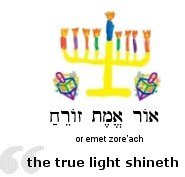|
|
|||||||||||||||||||||
 |
|||||||||||||||||||||
|
Learn Hebrew |
|||||||||||||||||||||
 |
|||||||||||||||||||||
|
Learn Torah |
|||||||||||||||||||||
|
December 2007 Updates Originally the firstborn son (bechor) was to be the priest (kohen) of the Jewish family. As the bechor, he would be required to offer avodah (sacrifice) on behalf of other family members. God said "the first issue of every womb among the Israelites is Mine" (Exodus 13:2). Thus firstborn sons were sanctified and obligated to serve as kohanim (priests) from birth. We see evidence of this in the lives of the early patriarchs, Abraham, Isaac, and even Jacob, who received the blessing of the firstborn through transfer from Esav. And because firstborn sons (bechorim) were consecrated as kohanim, during the Exodus from Egypt God spared them when He issued the 10th makah (plague) -- the death of the firstborn. But one of them, Caiaphas, who was High Priest (Kohen Gadol) that year, said to them, "You know nothing at all. Nor do you understand that it is better for you that one man should die for the people, not that the whole nation should perish." He did not say this of his own accord, but being high priest that year he prophesied that Jesus would die for the nation, and not for the nation only, but also to gather into one the children of God who are scattered abroad. (John 11:49-52) The irony is that those appointed to "redeem him" as His kohanim according to the terms of the Mosiac covenant were the very ones who made Him our Redeemer! In other words, those who were appointed to represent Yeshua before God were the very ones who offered Him up as a sacrifice for our sins.... The LORD God of Israel is an awesome God! The Midrash of Moses' Mouth 12.27.07 This week's parashah (Shemot) includes the story of the birth of Moshe (Moses), the great deliverer of the people of Israel, who was born during the perilous time when Pharaoh of Egypt had decreed to destroy all the Hebrew male children. His mother Yocheved attempted to hide him for a few months, but soon realized she could no longer do so and placed him in a basket among the reeds of the Nile before anyone could kill him. Her seven year old daughter Miriam stood by and watched to see what would happen to her brother. 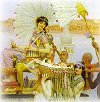 Providentially, Pharaoh's daughter came to bathe in the Nile and discovered the basket among the reeds. Moved by pity, the princess decided to adopt the baby even though he was a "despised Hebrew." Miriam (who witnessed all this) then approached the princess and offered to find a nursemaid for the child - and cleverly arranged for Moses' own mother to do the job! Parashat Shemot 12.26.07 I updated the weekly Torah portion for this coming Shabbat (Shemot), which is also the first portion of the second sefer (book) of the Torah (called "Exodus"). The English word exodus ("going out") comes from the Greek translation of the Rabbinic name of the book, Sefer Yetziat Mitzraim ("the book of the going out from Egypt"). In the Hebrew Bible this book is called Shemot ("names"), following the custom of naming a book according to its first significant word. 
Merry Christmas! 12.24.07 I sincerely wish each and every one of you a wonderful Christmas Season. May we all take time to reflect upon the profound gift of the One who was so great that He emptied Himself (κένωσις) of all His regal glory and power in order to be our earthly High Priest, able to fully sympathize with our weaknesses and frailties. The birth of Yeshua is the greatest miracle and gift ever given, and all the world's most glorious music played in perfect unison would never be enough to resound in complete thanks and adoration for God's salvation obtained through Him.
Even the pagan, postmodern world cannot escape the allure and romance implied in the gift of God's Son to the world, though of course it has hijacked the inner meaning of this miraculous event for commercialism and mammon. Nonetheless, we glory in the birth of Yeshua and understand that it represents the very salvation of the world. Indeed, the Father so loved the world (and that includes the secular world of postmodern despair) that He gave His only begotten Son to be the means of salvation for all....
The Beautiful Hebrew word Chesed 12.20.07 While working on Psalm 5 today, I reencountered one of the most treasured of Hebrew words: chesed. From the divine perspective, chesed is often translated as "grace, favor, lovingkindness, covenantal faithfulness, or loyal love." It represents God's faithful and gracious love and goodness to those who belong to Him. Chesed also refers to an act of lovingkindness or gracious action, i.e., the giving of oneself to help others without regard to repayment or personal benefit (gemilut chasidim refers to such acts of benevolence). As such, it is connected with the idea of loyalty and solidarity (echdut), and chesed is the essence of the great mitzvah to "love your neighbor as yourself." One who practices chesed is a chassid, and chassidut refers to a life of devoted love... In Psalm 89:2[3h] we read: עוֹלָם חֶסֶד יִבָּנֶה - olam chesed yibaneh - "the world will be built with chesed."
When was Jesus Born? 12.19.07 Those of you who have read my Christmas article understand that I think the Biblical evidence suggests that Yeshua (Jesus) was actually born during the festival of Sukkot but was conceived during the Festival of Lights (Chanukah, beginning on Kislev 25). For this reason we celebrate Christmas by remembering the greatest of all miracles -- the Incarnation itself -- when God the Son chose to divest Himself of his regal glory (kenosis) and began His redemptive advent into this world. This momentous event marked the climactic entrance of God into space-time history as the promised "Seed of the woman" (Genesis 3:15) who would come to deliver us from the kelalah (curse) of sin and slavery to the evil one. Blessed be His Name forever. kavod lelohim bamarom; shalom alei-aretz v'livnei adam ratzon New Hebrew Meditation 12.18.07 Today I wrote a new Hebrew meditation (Tzedakah, the Importance of Giving) based on a phrase from Psalm 37:21. Followers of Yeshua (Jesus) are to be known as tzaddikim (Matt. 5:16; 1 John 2:29, 3:7,10) because they demonstrate their love by giving to others. The Lord's love for us is truly chesed shel emet - true kindness that can never be repaid. May it please God to help us more deeply accept His love and experience it within our hearts in order to better understand the real meaning of tzedakah....  I also resumed working on the Hebrew Psalms pages, in particular Psalm 5. Asarah b'Tevet and Parashat Vayechi 12.17.07 This coming Wednesday is Asarah B'Tevet (the Tenth of Tevet), traditionally recognized as day of mourning for the loss of the Jewish Temple (Bet Ha-mikdash). Orthodox Jews will fast from sunrise to sunset to commemorate the siege of Jerusalem by Nebuchadnezzar, the King of Babylon (in 587 BC) -- an event that eventually led to the destruction of the First Temple and the 70-year Babylonian Exile of the Jewish people. I updated the weekly Torah portion for this coming Shabbat (Vayechi), which is also the final portion of Sefer Bereshit (the book of Genesis). 
Shiloh and Acharit Hayamim Parashat Vayechi begins: ויחי יעקב בּארץ מצרים שׁבע עשׂרה שׁנה - vayechi Ya'akov b'eretz mitzrayim sheva esrei shanah. .. "And Jacob lived in the land of Egypt for 17 years." The Jewish sages said that he lived 17 more years after he was reunited with Joseph because he had supported Joseph for 17 years before he was kidnapped. They reason this way based on Proverbs 12:28, בּארח־צדקה חיים - be'orach-tzedakah chayim - "in the path of tzedakah there is life" (tzedakah means an act of righteousness that comes from divine duty). When the time came for Jacob to die, he did not call the designated bechor (firstborn) of the family (that would be Reuben, who forfeited his status), but rather Joseph, the firstborn to his beloved wife Rachel. ועשׂית עמּדי חסד ואמת -- v'asita imadi chesed v'emet -- "deal with me with chesed and truth" (47:29), a phrase that has made its way into middot ha-lev (the Jewish qualities of heart) as chesed shel emet - offering true kindness because there is no hope of repayment. Jacob asked Joseph to not be buried in Egypt but rather in the resting place of Abraham and Isaac (i.e., the Promised Land), and he asked Joseph to swear that he would bury him there. As Joseph promised, Jacob "bowed his head," an indication that Joseph's dream that his brothers and even his father would bow down to him was fulfilled. עד כּי־יבא שׁילה...לא־יסוּר שׁבט מיהוּדה -- lo-yasur shevet mi-Yehudah...ad ki yavo shiloh -- "The scepter will not depart from Judah... until Shiloh comes" (49:10). The term "Shiloh" was understood by the early rabbis and Talmudic authorities as referring to the Messiah (Targum Onkelos, Targum Pseudo-Jonathan, and Targum Yerusahlmi), and this was interpreted to mean that the kingship would remain until the coming of the Mashiach. The word shiloh has been disputed among scholars. Some have said that the word may be a variant of the word she-lo which means "that is his," so the meaning of the verse may be "until he comes to whom the rod of kingship belongs," i.e., authority belongs to Judah until the Messiah appears. Others have said that since shiloh has the final Hey with a mappiq as a prepositional function of "to" or "towards," it actually means toward Shiloh, the very first capital of Israel in the Promised Land. In either case, however, the idea has to do with the authority invested in Judah as divine regent until the Messiah appears. Historically speaking, if we understand the regency of Judah to be invested in the Great Sanhedrin (after the last independent King of Judah Zedekiah was deposed), the scepter (shevet) would have departed from Judah in AD 6-7 after the Romans installed a procurator as the authority in Judea (thus replacing the Sanhedrin). However, the prophecy of Jacob did not fail, since the Mashiach had indeed come and was in their midst as Yeshua mi-netzeret (Jesus of Nazareth) at that time. In other words -- Yeshua is indeed the King of the Jews, though at present He is not physically reigning on David's throne (this will occur at His Second Coming when he returns to Jerusalem at the end of olam ha-zeh (this present age) to establish the Kingdom of God upon the earth). Hebrew Learning Tools 12.14.07 For those of you who are learning Hebrew, I would recommend an inexpensive product that will help you gain more confidence as you learn to read the Hebrew Bible. This product is called Reading the Bible in Hebrew, an audio CD that gently leads you through the first four chapters of Genesis. Each chapter is narrated twice -- once in fluent reading pace and a second time in a slower reading pace. I recommend it to all who want to learn proper Hebrew pronunciation from a native Israeli.  I also added some new Jewish/Hebrew music (including a new Messianic Music Collection) and updated some links to books I consider helpful (available from Amazon). If you haven't looked at the online store in awhile, it might be worthwhile to see the latest. Shalom chaverim! 12.13.07 We finished up Chanukah over at my in-laws Tuesday night, lighting six chanukiot and eating potato latkes and other fried food! It was a blessed time, especially for Josiah (who loves lighting the candles, playing dreidel, saying the berachot, and esp. eating as much Chanukah gelt as he can find). 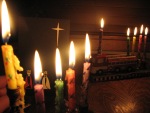 I am busy trying to get some new material ready for a new book, though the work (as usual) has to be done late at night. It's now nearly 4 am as I write this. Please offer up a prayer for me (as some of you know, I deal with chronic pain). I hope to resume work on the Psalms section later this week, though I might not find the time until the weekend. Kol tuv, chaverim... 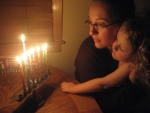 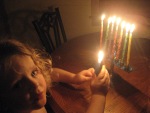 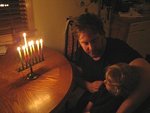 Happy Chanukah, chaverim... This portion of Torah (near the end of Genesis) includes Judah's teshuvah (repentance) that resulted in Joseph's revelation to his brothers: ani Yosef ha'od avi chai ("I am Joseph; is my father alive?"). Notice that this is a strange question since the brothers had earlier reported the condition of Jacob to Joseph. When Joseph saw that his brethren were afraid, he said, g'shu na elai - "Please come near to me." "Your eyes see..." Joseph revealed himself to his brothers using Hebrew speech as a token of his identity. Chanukah 5768 Continues! 12.09.07 Shalom and happy Chanukah, chaverim! It's been a long weekend, and unfortunately my pain returned last night, but we are thankful to the LORD for the gift of life in His precious Son, and we rejoice in the light He so graciously imparts to all who call upon Him in the truth.  I finished up Hebrew Psalm 4 this weekend and hope to get back to working on other Psalms later this week. I want to thank so many of you for standing with Hebrew4Christians over this last year... I am touched and unspeakably grateful for so many of you. Celebrating Chanukah 5768 12.07.07 Happy Chanukah (day 4)! Here are a few pictures we took during the first few days of Chanukah, chaverim. From our family to you -- chanukah sameach -- and may you be filled with the Light of His Presence during this special time.  A word of thanks, first to the LORD God of Israel and also to many of you who prayed for me recently. My pain levels are down and the entire family is over the flu. I am grateful to our LORD for His mercy and compassion, and throughout these recent trials, I kept hearing the Spirit remind me of the very first middot (attributes) revealed of the Sacred Name YHVH: rachum v'chanun - merciful and gracious... He is indeed, and He provides special consolation to us when we are in pain and sorrow. Blessed be His Name forever. Getting Real... 12.06.07 Happy Chanukah (day 3)! I am still gripped with the intercessory work of Yeshua (Jesus) as our Kohen Gadol (High Priest) of the New Covenant... Yesterday's keyword for me was paga, a powerful word that reveals many deep aspects of the holiest moments of the LORD's intercession performed for us at Moriah. Maybe that's why I felt the need to recall an old childhood memory from Margary Williams' classic tale The Velveteen Rabbit:
And this calls for another quote: "Never explain yourself. Your friends don't need it and your enemies won't believe it" (Belgicia Howell).
Jesus our Intercessor 12.05.07 Happy Chanukah (day 2)! Today I had opportunity to revisit the Hebrew word that is often translated as "intercessor" in English. The word mafgia (Isa. 59:16) comes from paga, a verb with various meanings based on tense (e.g., to encounter, to fall upon; to strike; to reach the mark; to entreat, make intercession). In the Hiphil it can mean "intercede" (before men: Jer 36:25; "to beg": Jer 15:11; Isa 53:12; Isa 59:16). An intercessor is therefore one who makes "contact" with God as opposed to someone simply dabbling in prayer. Paga is also a term for warfare or violent meetings, and reveals the violent meeting between the powers of hell and Jesus at the Cross at Moriah, as well as the agony in which Jesus offered up His life for us.... Should Christians celebrate Chanukah? Well Jesus Himself did so (John 10:22-24), and for those of you who have read my Christmas article, you understand that I believe that Jesus was actually born during the festival of Sukkot and conceived during the Festival of Lights (Chanukah). For this reason, I can join in Christmas festivities, but I understand the celebration to center on the Miracle of the Incarnation, when God the Son chose to divest Himself of his regal glory and began his redemptive advent into this world.
Parashat Miketz 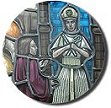 I updated the weekly Torah portion for this coming Shabbat (Miketz), which happens to fall on day 5 of Chanukah this year (which is chol mo'ed so there are no additional Torah readings at the synagogue). 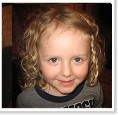 12.02.07 I reworked more of the Psalms material tonight. I decided it was better to put the full Hebrew text (and English translation) first, and then add commentary on each verse (to see what I mean, look at Psalm 1). More Hebrew Psalms 12.01.07 I have begun adding text, audio, and graphics for more Hebrew Psalms, though I have yet to write commentary or provide notes for each pasuk for many of them.  I can't begin to tell you how much "busy work" is involved in working with (and cleaning up) the audio portions, typing the Hebrew text, making the graphic files for each page, creating the flash files for each perek (chapter) and pasuk (verse), and then writing my commentary for each verse. However, if (IY"H) this project ever gets finished, it will be entirely unique -- with all the Hebrew Psalms of the Scriptures online here, with audio and verse by verse commentary (see Psalm 1 or Psalm 2 for a preview). |
||||||||||||||||||||||||||||||||||
|
Hebrew for Christians |
||||||||||||||||||||||||||||||||||
|
||||||||||||||||||||||||||||||||||










